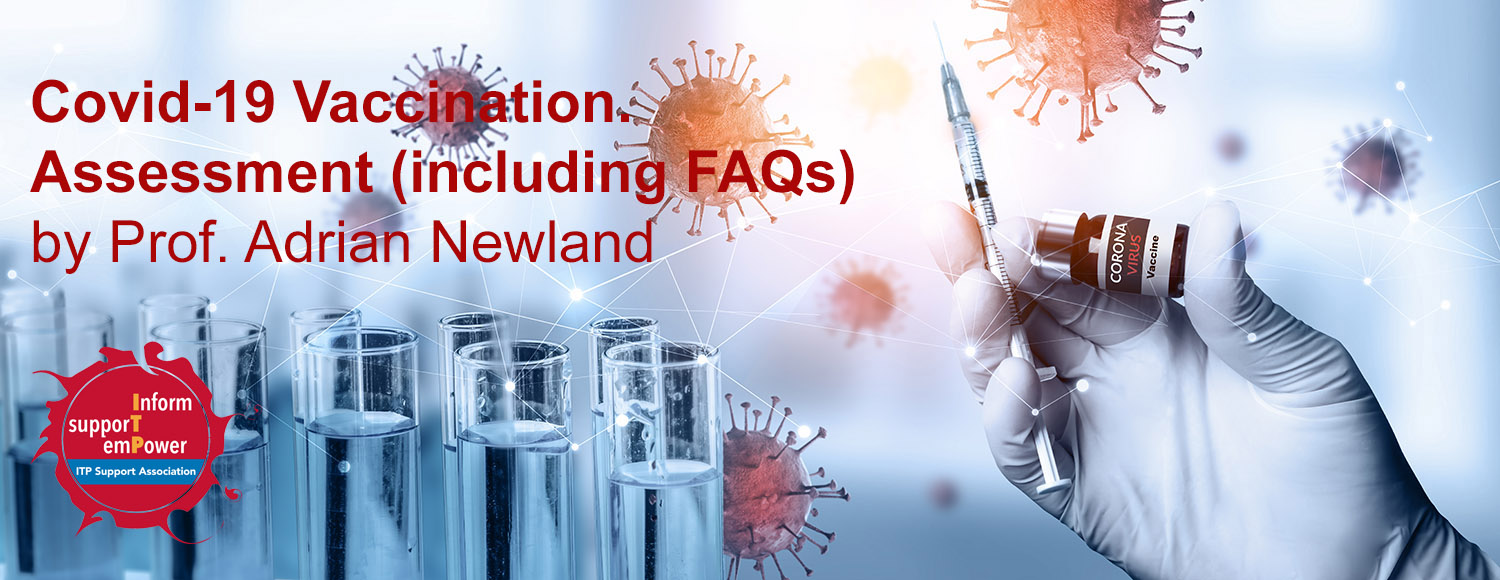
Covid-19 vaccination. Assessment by Prof. Adrian Newland
-
by
lucys
We have also updated the answers to our most frequently asked questions (FAQs) regarding ITP and the Covid-19 vaccines.
There has been a steady stream of positive news regarding the trials and rollout of the various Covid-19 vaccines in recent weeks, this has also resulted in questions from ITP patients.
Questions such as, I have ITP, will I be able to have one of the vaccines? or Will I be limited to one particular vaccine over another?
It is still early days and not all of the trial data is available, but Professor Adrian Newland has kindly given us his assessment of the current position, which for everyone, including those with ITP is looking more hopeful.
Covid-19 vaccination. Assessment by Prof. Adrian Newland
There looks to be some relief on the way as we now have sight of 3 potential vaccines against Covid-19. All slightly different, which is a good thing, which means the virus will be attacked in different ways.
The data on the Oxford/Astra Zeneca vaccine looks promising. The pharmaceutical company, Pfizer, has also developed a vaccine that has shown to be 90% effective and we have seen more data on that. Protection is apparently achieved 28 days after the initiation of the vaccination, which consists of two doses given 21 days apart. The vaccine has already been through Pfizer’s own trial and enrolled more than 40,000 people from across the world. 41 per cent of these participants are aged between 56 and 85 years old and it’s really encouraging to know that the Pfizer vaccine seems to work on older people as effectively as in younger ones.
Although the full trial data has yet to be published on any of the vaccines, the companies all say that there have been no serious safety concerns.
It is natural to have questions about the safety of a vaccine produced so quickly. However, it is important to say that the vaccines will have to meet strict safety criteria in order to satisfy the MHRA, the UK’s regulator of medicines and medical devices, responsible for ensuring their safety, quality and effectiveness. The MRHA will also seek advice from the Government’s independent advisory body, the Commission on Human Medicines. The Commission will also critically assess the data on the vaccines before advising the UK Government on the safety and quality of this vaccine. It is important to understand that their development has been based on much work that was already underway. The speed of development and size of the trials have reflected the enormous effort and funding that has gone into the whole process and corners have certainly not been cut.
The data on the vaccine will also be reviewed by the US Food and Drug Administration and the European Medicines Agency for approval, which are the counterpart regulatory bodies in the USA and Europe.
The news of this vaccine is obviously encouraging and can hopefully guide us out of this pandemic, but the full safety data of the vaccine still needs to be examined carefully by the regulatory bodies to ensure its safe for the general public and we await this news with cautious optimism. We hope that the first batches will be approved for use later in December.
We do not yet know who will be offered the vaccines in the first instance, but it is unlikely that a diagnosis of ITP alone will be sufficient. Although the intention is that as many of the population as possible will be offered one of the vaccines eventually, the early categories will be guided by age, other susceptibilities and probably to key workers. We will have to wait government guidance on this.
There is nothing to suggest, at the moment, that one will be better than another and I suspect which vaccine is used will depend on availability. The Oxford/Astra Zeneca vaccine will be cheaper and easier to handle as it does not need storage at very low temperatures. The third product, from a company called Moderna, is also on track but will probably concentrate its first launch in the USA as it was developed with support from the US Department of Health. It is also the most expensive.
All three vaccines will be safe for patients with ITP. None are produced from live virus so there is no risk from that point of view and there is no need to favour one over the other. All will be given by injection and this may pose some risk of local bleeding in patients with platelet counts below 10 but we feel that, with local pressure and precautions during the vaccination, no patient should be excluded from receiving the potential benefits.




